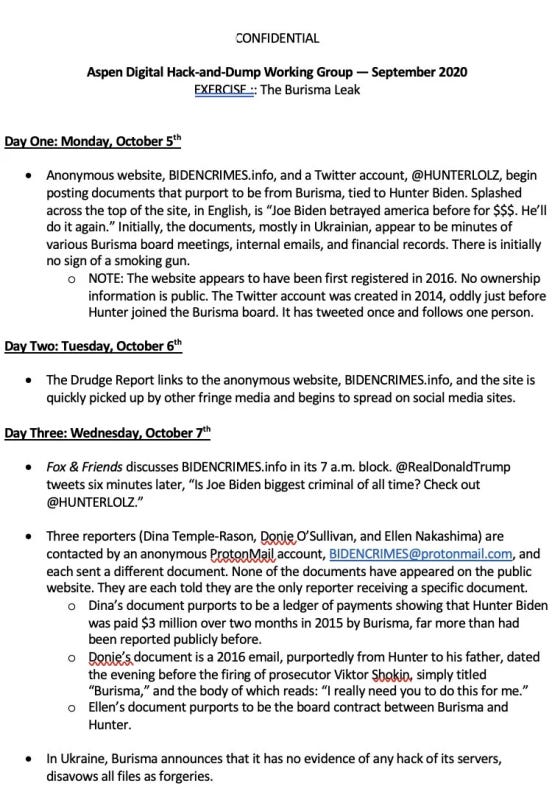The Australian Government Reboots the Misinformation Bill: The Totalitarian March
By Andrew Lowenthal
The Australian Labor Party reintroduced its misinformation and disinformation bill. I did a deep dive into the bill last May. Among its many flaws, the biggest is its very origins.
As Communications Minister Michelle Rowland said in Parliament on September 12, “This bill seeks to strengthen the voluntary code by providing a regulatory backstop.”
That code was co-written by First Draft, participants in the Aspen Institute’s coordinated effort to suppress the Hunter Biden laptop story.
If that story is new to you, the Twitter Files revealed that in August 2020 the Aspen Institute organised a “table-top” exercise with Twitter, Facebook, First Draft, and a host of media organisations including the New York Times and Washington Post, that ran through a day-by-day playbook of how they would respond to the release of a Hunter Biden laptop. The story didn’t break publicly until October, so how did the Aspen Institute know two months in advance?

Mark Zuckerberg thought the suppression of the Hunter Biden laptop story was so egregious he recently issued a sort of apology.
To be even more explicit, the bill extends the code, which is written in part by an organisation that worked to suppress a true story of major historical significance. It should be dead on arrival. It tells you all you need to know about the real aims of the bill.
But the Labor Party is adamant they want it passed, and they can likely count on the Greens and independents in the Senate to pass it. It was after all the Greens that recently teamed up with Labor to pass the Digital ID bill.
Predictably Rowland cited the Bondi Junction attacks and the riots in the UK as part of her justification for the bill. Perhaps the most significant disinformation spread about the Bondi stabbing was reporting done by mainstream media. In such cases, there are already defamation laws that can deal with such issues. Interestingly professional news organisations remain exempt in the updated version of bill.
Regarding the UK, as I have recently written, misinformation is a convenient scapegoat for what is actually a massively complex problem that has its foundations in material reality, not in people’s perceptions.
Interestingly the bill’s relaunch comes a week after failed US Disinformation Czar Nina Jankowicz visited Canberra. Did she meet with any politicians and advise them on setting up Australia’s own Ministry of Truth? I’d ask her but she blocked me last week, despite us never having interacted.
That conversation platformed Guardian columnist and paragon of Leftism Van Badham. Does Van Badham understand that Nina works closely with security and intelligence agencies such as the Department of Homeland Security? DHS used to be a stock standard foe of progressives during the War on Terror for its hyper-surveillance of Muslim communities and many an alleged civil liberties violation. Now its former employees are just the right people for Leftists to share the stage with.
The best place to get the details on the changes to the bill is via Rebekah Barnett’s recent story (which she also interviewed me for), though I offer a few other quick comments…
There are some mild improvements to the bill, including specifications that “harms” should be “serious,” “imminent,” and with “significant and far-reaching consequences;” however, the fundamentals remain the same. The bill outsources truth policing to social media platforms on the pain of having to pay up to 5% of their annual revenue if they fail to comply. The result is sure to be a massive chilling effect.
Content only has to be “reasonably verifiable as false, misleading, or deceptive,” but who is doing the verification? Anyone who followed the Covid debacle knows that what is “false” today in a few months becomes plausible, and a few months after that it becomes true – whether that was the theory that the virus may have originated in a lab, the collateral of lockdowns, or that the vaccines would stop transmission. In the future questioning government authorities on these issues will be against the law. In fact, it is stated so explicitly. Harm is to question “the efficacy of preventative health measures.”
For progressives thinking of supporting this, the Right will take power again, whether in the next election, the one following, or the one after that. If you are on the Palestine side of the Israel-Gaza conflict, make no mistake, these laws will come for you.
This is not about defending Musk or Zuckerberg, though that is how they are trying to frame it – goodies vs baddies – this is about defending fundamental civil liberties that go beyond Left and Right. Other than dealing with criminal behaviour the government has no business policing speech.
I hope progressives can grasp that quickly because we don’t have much time.
Background story: Australia’s misinformation bill was seeded by the global censorship vanguard
Republished from the author’s Substack
Published under a Creative Commons Attribution 4.0 International License
For reprints, please set the canonical link back to the original Brownstone Institute Article and Author.
Author
Andrew Lowenthal is a Brownstone Institute fellow, journalist, and the founder and CEO of liber-net, a digital civil liberties initiative. He was co-founder and Executive Director of the Asia-Pacific digital rights non-profit EngageMedia for almost eighteen years, and a fellow at Harvard’s Berkman Klein Center for Internet and Society and MIT’s Open Documentary Lab.




